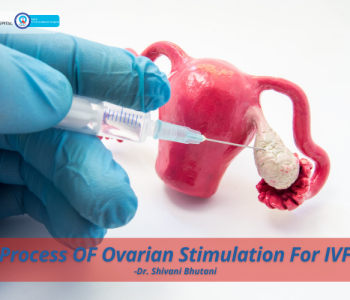 IVF
IVF
c
The process of Ovarian stimulation for IVF is an important step in successful assisted reproduction. This is the phase where doctors prescribe hormone medications that stimulate a woman’s ovaries to produce 5 to 10 mature eggs or oocytes, instead of one egg in normal ovulation.
These eggs would be then retrieved from the ovaries and fertilized with sperm in the lab. The benefit of having multiple oocytes in one menstrual cycle is that it
- Increases the chances of having more than one viable egg for fertilization
- Helps in making multiple embryos which increase the chances of pregnancy
- May provide extra embryos to freeze for use in future pregnancies.
The medications or fertility drugs are given under an IVF specialist’s care. They may be in the form of oral medicines or injections.
How Ovarian Stimulation Works
First of all, the IVF patients undergo a complete infertility evaluation at Eva IVF Hospital. It includes factors such as age, antral follicular count, ovarian reserve hormone testing, prior treatments, and the final infertility diagnosis.
Once it is established that the patient will go for In-vitro-fertilization, the process of ovarian stimulation for IVF is initiated. There are several options for it, all involving a series of various medications administered over several days or weeks.
This is the stimulation protocol. However, there is no single way that would work for every woman undergoing fertility treatment. Some patients may produce very few ova, while others may get hyperstimulated.
For some, the stimulation period may be small compared to others whose follicles are fast to mature. The selection of the proper ovarian stimulation is critical to the chances of fertilization success IVF success. It can impact the egg quality to a great extent.
Dr. Shivani Bhutani individually recommends the appropriate dose and timing to start the medications for every patient. Too much or too little medication can have a detrimental impact on egg quality.
The process starts with ovarian suppression by using pills. When ovarian suppression is achieved, then recombinant follicle-stimulating hormone is administered for ovarian stimulation.
The ovaries and fallopian tubes are then closely monitored via ultrasounds every three to four 4 days along with blood hormone testing.
After a majority of the follicles (pockets that contain ova) are big enough, ovulation is triggered with hCG. On the third day, the eggs are retrieved.
The medications that are used for the stimulation are derivatives of two important hormones, Follicle Stimulating Hormone and Luteinizing Hormone (LH). these are also called gonadotrophins.
What Are Gonadotrophins?
Gonadotropins are a combination of two hormones used in the process of ovarian stimulation for IVF. these two hormones, namely, luteinizing hormone (LH) & follicle-stimulating hormone (FSH), are normally secreted by the pituitary gland. They naturally stimulate the ovaries to
- produce a follicle, which contains an ovum (oocyte), and
- to release the egg from the ovary.
Most gonadotropin preparations used for infertility treatment are recombinant preparations that need to be injected under the skin(subcutaneous) to be effective. For a majority of women, only FSH injections treatment is recommended. Ladies who do not have regular periods usually require a combination of both LH and FSH.
FSH incites follicles to grow better during menstrual succession. Typically, many follicles die off before ovulation as FSH levels in the blood fall. However, when a high level of FSH is maintained with injections, it induces the ovaries to produce more mature eggs.
Before the ovulation, there is a spike in LH due to progesterone, which causes ovulation. Administering a big dose of human chorionic gonadotropin (hCG) stimulates ovulation, which starts the process.
For the Patient- How To Prepare For OS
While a couple is undergoing treatment and evaluation at Eva fertility center, they should pay close attention to their medication calendar and meticulously follow the instructions to have the best chance at successful egg retrieval.
You may also pay attention to diet and stress levels as they affect hormone levels too.
Diet
- Eat a healthy, well-balanced diet.
- Start taking prenatal vitamins.
- Maintain a healthy weight.
- Stop smoking, drinking alcohol, and recreational drugs.
- Reduce or eliminate your caffeine intake.
Manage Stress
To manage stress, practice light yoga, meditation, and a good amount of communication between the husband and wife. You can also become part of a support group or undertake to counsel as suggested by your IVF specialist at Eva.
Read more: How Do You Fix Implantation Failure?
Many couples are overwhelmed by the fear and anxiety that comes with ART treatment. There is nothing to worry about though. Rather than feeling apprehensive, you should educate yourself about the entire process.
You may refer to our other blog posts which explain every aspect of the journey and the immense possibilities it has for you as a couple.